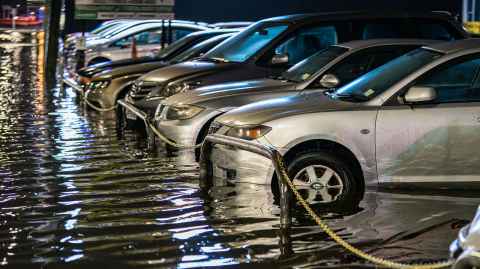What do our leaders really mean when they talk about 'adaptation'?
22 October 2025
Opinion: We can’t continue to treat climate adaptation as a fiscal liability – we need a transformative plan, not 'business as usual', says Sasha Maher.

At its core, adaptation to climate change is about survival – the capacity to adjust, to evolve, and to endure within a changing context. Mitigation, by contrast, is the effort to stem the tide, to reduce the damage before it becomes irreversible. Together, they speak to the moral and material choices before us: evolve with intent or face the consequences of inaction.
Readers probably knew that, but it is worth interrogating what we mean by both, and what it means to the leaders whose responsibility it is to guide the way we respond to either, ensuring those we do so in a collectively minded and fair way.
The words are frequently invoked, though often loosely and without clear definition, as if adapting and mitigating against the accelerating toll caused by global warming only needs a few sea walls, and giving people ‘risk information’ so if they have a home now identified as flood prone, they should get out of harm’s way.
Assumption of buyouts after disasters ends now – minister
New Zealand is a ‘risky’ place, a country acutely vulnerable to rising seas, floods, and ecological disruption. How we ‘adapt’ is being shaped by leadership – or, more accurately, by its absence.
We are not the first researchers to argue that when we talk about adaptation, this requires genuine innovation not just risk management – telling people that they need to move to higher ground and so on. We need to be clear about who is most at ‘risk’ and have the least capacity to cope with the impacts, and not just financially.
Most of New Zealand’s major cities, as well as numerous towns and other settlements, are coastal or built on floodplains. Climate change is expected to worsen existing hazards, and the most threatened are Indigenous Māori, people with disabilities, and low-income communities.
The coalition Government has reframed adaptation as a problem involving inadequate information and the poor pricing of risk. Leadership, in their view, should be devolved to homeowners and insurers.
Our recent research into climate adaptation leadership in Aotearoa reveals a troubling trend: a drift towards incrementalism and procrastination and delay that risks entrenching inequality and exacerbating climate harm. This is despite growing calls from the Intergovernmental Panel on Climate Change and civil society for transformative adaptation – the kind that reimagines systems, redistributes power, and centres justice.
We analysed 35 public documents and conducted 16 interviews with key stakeholders involved in shaping New Zealand’s adaptation strategy. What we found was a striking consensus on the purpose of adaptation leadership – to reduce risk. But when it came to why provide leadership and for whom, the gaps widened.
New Zealand’s political leadership is fixated on protecting property and minimising fiscal exposure. That is known as ‘incremental adaptation’, which could be described as maintaining the status quo; using hard engineering solutions, and market mechanisms as if climate change is a modest market failure that can be corrected with a bit of policy tweaking.
Transformative adaptation, by contrast, demands deeper, systemic change. It requires leaders to confront uncomfortable truths, redistribute resources, and tackle uncertainty, approaching it as an opportunity for a better world for others including non-human species. It means recognising that climate change is not just a technical challenge, but a social and ecological one – and leadership must be about more than managing risk.
The coalition Government has reframed adaptation as a problem involving inadequate information and the poor pricing of risk. Leadership, in their view, should be devolved to homeowners and insurers. The goal? We can only guess; to avoid bearing the costs and evade responsibility? This approach not only sidelines vulnerable communities – including Māori, renters, and low-income households – but also ignores the impact that individualistic solutions such as personal sea walls may have on the environment.
What could ‘transformative adaptation’ look like? It requires a conscious redirection of our economic system. The platform on which we build this requires political stability and economic sustainability. Political stability requires a taxation system that is fair and inclusive. Current debates about growing wealth gaps, our reluctance to address their consequences, and the measures that may be used, are on point. Economic sustainability requires a shift of investment into the ‘productive’ economy, rather than, for example, the continued fetishisation of property. This narrow focus keeps us trapped in the cycle of climate risk.
If we continue to treat adaptation as a fiscal liability rather than a collective responsibility, we will not only fail to protect our most vulnerable, but we will also fail ourselves. Leadership is not about avoiding costs and sidestepping responsibility. It is about owning this position, and formulating policy that looks beyond the short-term options provided by ‘the market’.
In the face of climate change, that is the only kind of leadership that matters.
Dr Sasha Maher is a lecturer in sustainability at the University of Auckland Business School.
This article reflects the opinion of the author and not necessarily the views of Waipapa Taumata Rau University of Auckland.
This article was first published on Newsroom, Property fetish ducks climate responsibility, 22 October, 2025
Media contact
Margo White I Research communications editor
Mob 021 926 408
Email margo.white@auckland.ac.nz